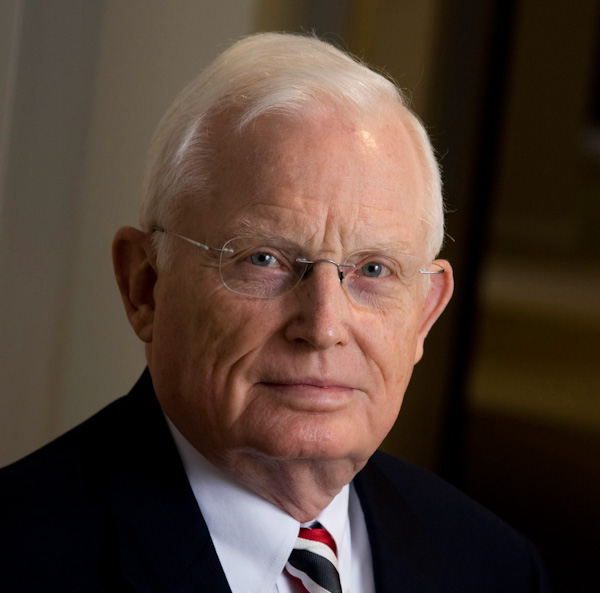ABA Medal recipient puts democratic principles and indigent defense at center of long career

Throughout his career, which began in 1962, Emmet Bondurant has been a steadfast advocate for clients in consequential civil rights and constitutional cases involving voting rights, equal representation, habeas corpus and the death penalty.
Emmet Bondurant often shares a message with younger lawyers, and it starts with simple physics.
He asks them to think about a lever, a tool made from a beam that pivots on a fixed point. This tool works—and becomes valuable, he says—by allowing a light weight at the end of a long arm to move a heavier weight at the end of a shorter arm.
“You have unique leverage no one else has—a single lawyer with a single case about which he feels strongly may in fact be able to achieve a court decision that will reform the entire legal system,” says Bondurant, a founder of Atlanta-based litigation boutique firm Bondurant, Mixson and Elmore and an ABA member for nearly 60 years. “Lawyers should recognize they have that opportunity and take advantage of it.”
“There are a lot of wrongs around the world and certainly around the country that could be cured with a correct legal decision,” he adds.
During next week’s ABA Annual Meeting, Bondurant will receive the ABA Medal—the highest honor bestowed by the association—for his own longtime dedication to righting wrongs in the legal system. Throughout his career, which began in 1962, he has been a steadfast advocate for clients in consequential civil rights and constitutional cases involving voting rights, equal representation, habeas corpus and the death penalty.
Among his landmark cases was Wesberry v. Sanders, which Bondurant successfully argued before the U.S. Supreme Court when he was only 26. In its 1964 decision, the Supreme Court held for the first time that congressional districts must contain equal populations. This became known as the “one person, one vote” rule.
Five decades later, Bondurant represented Common Cause, an organization working to preserve and improve American democracy, in another landmark redistricting case. In Rucho v. Common Cause, he urged the Supreme Court to end the practice in which state legislatures deliberately draw voting districts to disadvantage residents based on their political views. He refers to the case as a “bookend” to his winning argument in Wesberry.
 During next week’s ABA Annual Meeting, Emmet Bondurant will receive the ABA Medal—the highest honor bestowed by the association—for his own longtime dedication to righting wrongs in the legal system. Photo courtesy of the ABA.
During next week’s ABA Annual Meeting, Emmet Bondurant will receive the ABA Medal—the highest honor bestowed by the association—for his own longtime dedication to righting wrongs in the legal system. Photo courtesy of the ABA.
‘The quiet revolution’
While the Supreme Court held in 2019 that federal courts did not have jurisdiction to review partisan gerrymandering, Kathay Feng, the vice president of programs for Common Cause, contends that Bondurant’s influence on the issue extends beyond the decision.
Because the Supreme Court determined it was up to states to handle partisan gerrymandering, Feng says Common Cause used Bondurant’s arguments to prevail in a state court case in North Carolina. In that 2019 decision, the court ruled that legislative districts drawn by lawmakers to remedy a racial gerrymander were an illegal partisan gerrymander that violated the state’s constitution.
“Emmet’s approach, his establishment of the methodology for which you would show that partisan gerrymandering had happened, and his legal vision for what the standard should look like if the court were to accept it, ultimately has created a legacy far beyond what the Supreme Court could ever have decided,” Feng says. “It plays out state by state, so that’s where the quiet revolution is happening.”
“That is the transformative impact of his work,” she adds. “Up until then, people really didn’t think we could tackle this big problem of partisan gerrymandering.”
Follow along with the ABA Journal’s coverage of the 2024 ABA Annual Meeting here.
‘Right thing to do’
From the time Bondurant was a first-year associate, he felt compelled to use his skills for the greater good.
He graduated from the University of Georgia School of Law in 1960 and subsequently earned his LLM from Harvard Law School in 1962 before joining the firm now known as Kilpatrick Townsend & Stockton. As he built his practice in business litigation, he asked if he also could represent three inmates in the Atlanta federal penitentiary who were appealing their convictions.
The firm agreed, giving Bondurant a rare opportunity to pursue cases as a new lawyer that didn’t bring in revenue but changed the lives of some of the state’s most vulnerable residents. In the end, he helped reverse all three convictions.
“Kilpatrick was a unique place,” Bondurant says. “Their attitude was, ‘If this was something you were interested in, you can work on it at night and on weekends.’”
“No other major law firm in Atlanta would have given an associate the freedom to take on what at the time were considered controversial cases,” he adds.
In 1977, Bondurant opened his own firm, where he also prioritized pro bono and encouraged his colleagues to do the same.
He represented attorney Elizabeth Hishon in Hishon v. King & Spalding, a groundbreaking gender equality case. The Supreme Court unanimously ruled in 1984 that firms are subject to Title VII and prohibited from discriminating against women when selecting partners.
Bondurant fought for fairness in the criminal justice system in Georgia in other cases.
In 1989, the argument he made in an amicus brief that prevailed before the Georgia Supreme Court in Fleming v. Zant. This case established the rule in Georgia that executing defendants who are mentally impaired constitutes cruel and unusual punishment. The U.S. Supreme Court reached the same conclusion in Atkins v. Virginia 13 years later.
In 1991, Bondurant won a petition for habeas relief in Nelson v. Zant in the Georgia Supreme Court. In representing Gary X. Nelson, who spent nearly 12 years on death row, he and other pro bono attorneys discovered prosecutors withheld key evidence during Nelson’s trial. As a result, Nelson’s conviction was vacated and he was released.
Bondurant also sought to reform the indigent defense system. In 2003, he helped pass the Georgia Indigent Defense Act, and from 2003 to 2007, Bondurant was the first chairman of the Georgia Public Defender Standards Council. He currently serves on the advisory board of Gideon’s Promise, a nonprofit organization aiming to build the ranks of public defenders.
Bondurant views this work as nonnegotiable. He did not want his legal career to be defined by or limited to a sole business practice or to the representation of only paying clients.
“I wanted the opportunity to challenge the constitutionality of practices that were well established and long accepted—simply as a matter of principle because it was the right thing to do,” he says.
Life of service
Bondurant has served his community in other ways, including as president and a director of the Atlanta Legal Aid Society. He also served as chair of the Atlanta Charter Commission, leading a two-year effort to rewrite the 100-year-old Atlanta City Charter.
He has served on the National Governing Board of Common Cause and represented the organization in other pro bono cases, including Common Cause v. Biden, a challenge to the constitutionality of the U.S. Senate’s 60-vote filibuster rule. (In its 2014 decision, the U.S. Court of Appeals for the District of Columbia Circuit said plaintiffs did not have standing to challenge the rule.)
Gregory Diskant, of counsel at Patterson Belknap Webb & Tyler in New York City, met Bondurant through his work with Common Cause on the case. He characterizes Bondurant as a brilliant lawyer with unmatched knowledge of Supreme Court case law—as well as inherent opportunities for change.
“That was my first exposure to Emmet,” Diskant says. He marveled at Bondurant “taking something that everyone in the world thinks is ingrained in truth and precedent and part of the social structure, and realizing it’s not, and challenging it.”
“It was a brilliant exercise,” Diskant says. “I was awestruck.”

Bondurant, who retired from his firm in 2020, says issues of democracy continue to be “of paramount importance because the entire legitimacy of representative government is based on the ‘consent of the governed’ and the fairness of our elections in which everyone has an equal right to vote.”
He shares a similar perspective when discussing the importance of indigent defense.
“The legitimacy of the entire criminal justice system requires that trial be truly fair, both in theory and in fact and that every defendant, no matter how poor, be represented by a real lawyer, and not by some lump with a law degree who simply goes through the motions and whose only objective is keep the court’s calendar moving with a minimum of effort and without making waves,” he says.
The ABA Medal “recognizes leaders of the bench or bar who have rendered conspicuous service to the cause of American jurisprudence.” Bondurant will receive the award during the ABA Annual Meeting’s General Assembly on Friday, Aug. 2.
The 2024 ABA Annual Meeting, which runs from Wednesday, July 31, through Tuesday, Aug. 6, will be held in Chicago.
Write a letter to the editor, share a story tip or update, or report an error.


